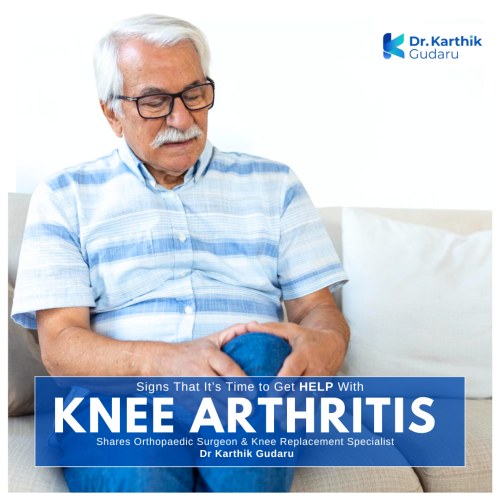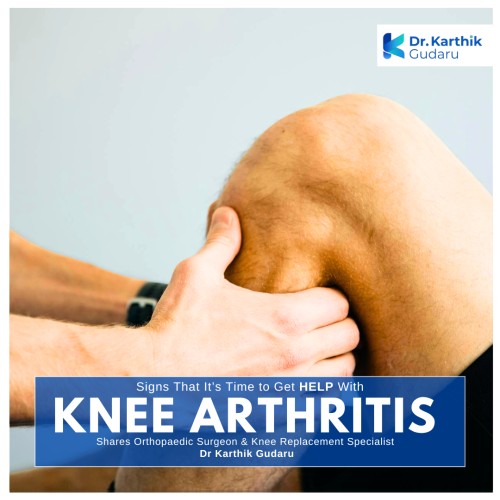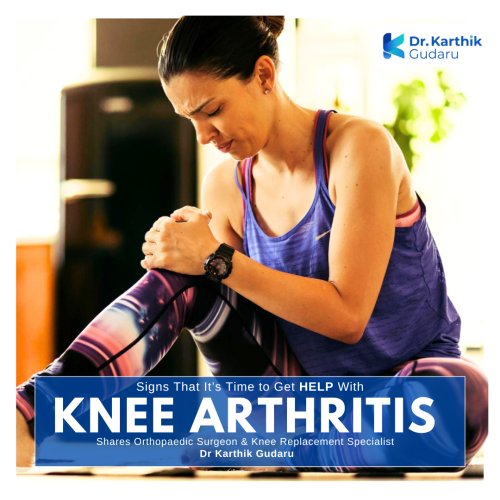Knee arthritis is a common condition, especially among older adults, causing pain, stiffness, and reduced mobility. While early stages can often be managed with lifestyle changes, physical therapy, and medications, there comes a point when professional intervention is necessary. Recognising the signs that it’s time to seek help can prevent further joint damage, improve quality of life, and ensure timely treatment, shares Dr Karthik Gudaru, a leading orthopaedic surgeon for knee joint treatments and one of the best knee replacement surgeons in Hyderabad and India.
What are the warning signs of worsening knee arthritis?
Understanding the early indicators of progressing knee arthritis can help patients seek medical attention before the condition severely affects mobility and daily life.
Persistent Pain
Pain that persists even during rest, worsens at night, or does not respond to over-the-counter medications may indicate that the arthritis is advancing and requires professional evaluation.
Stiffness and Reduced Range of Motion
Difficulty bending or straightening the knee, or feeling like the joint is “locked” or stiff for long periods, can signal worsening cartilage damage and reduced joint function.
Swelling and Inflammation
Visible swelling, warmth, or tenderness around the knee joint may suggest active inflammation or fluid accumulation, which should be assessed by a doctor.
Difficulty Performing Daily Activities
When simple activities such as climbing stairs, walking, or standing for long periods become challenging, it indicates that arthritis is interfering with functional mobility and daily life.
Audible Sounds from the Knee
Clicking, popping, or grinding sounds (crepitus) when moving the knee can signal cartilage wear and joint degeneration, highlighting the need for medical attention.
How can seeking help improve knee arthritis management?
Getting timely medical help for knee arthritis can slow progression, relieve pain, and enhance mobility. Early intervention allows doctors to recommend treatment plans tailored to the severity of the condition.
Medical Evaluation
Consult an orthopaedic specialist to ensure a proper diagnosis. Imaging tests such as X-rays or MRI scans can reveal the extent of cartilage damage and joint deterioration. Accurate diagnosis is the first step toward effective treatment.
Personalised Treatment Plan
A doctor can recommend a combination of medication, physical therapy, and lifestyle modifications based on the severity of arthritis. Targeted treatment helps reduce pain, prevent further joint damage, and improve day-to-day function.
Physical Therapy and Exercise Guidance
Professional guidance in exercises and physical therapy strengthens the muscles around the knee, improves flexibility, and reduces stress on the joint. This approach slows arthritis progression and enhances mobility.
Surgical Interventions if Needed
In advanced cases, procedures such as knee arthroscopy or joint replacement may be necessary. Seeking help early allows for timely planning and better surgical outcomes if conservative treatments are insufficient.
Lifestyle and Supportive Measures
Doctors can recommend diet, supplements, and weight management strategies that reduce pressure on the knee joint. These measures improve overall joint health and contribute to long-term pain management.
Knee arthritis can gradually impact mobility and quality of life, but recognising the warning signs—persistent pain, stiffness, swelling, functional difficulties, and joint sounds—helps patients seek timely medical help. Early intervention, proper diagnosis, personalised treatment, and professional guidance can slow disease progression, relieve pain, and restore mobility. Addressing knee arthritis at the right time ensures better outcomes and allows individuals to maintain an active, independent lifestyle.

Dr Karthik Gudaru, MS Orthopaedics, MBBS, Fellowship in Knee and Hip Arthroplasty (USA), Fellowship in Computer-Assisted Navigation Joint Replacement Surgery (Germany), is one of Hyderabad’s leading orthopaedic surgeons with an outstanding reputation for precision, innovation, and excellence in joint replacement and orthopaedic care. Widely recognised as the best knee replacement specialist in Hyderabad, he brings a deep commitment to patient-centred care and cutting-edge surgical techniques.
Dr Karthik Gudaru is currently the Senior Orthopaedic and Joint Replacement Specialist, Department of Orthopaedics at GreenMed Hospital, Srinagar Colony, Hyderabad and Assistant Professor and Consultant Orthopaedic at BIRRD Hospital (Balaji Institute of Surgery, Research and Rehabilitation for the Disabled), Tirupati.
Dr Karthik Gudaru’s Treatment Specialisation are –
Knee Joint Treatments (Including Total Knee Replacement Surgery)
Shoulder Joint Treatments (Including Total Shoulder Replacement Surgery)
Hip Joint Treatments (Including Total Hip Replacement Surgery)
Elbow Joint Treatments (Including Total Elbow Arthroscopy)
Computer-Assisted Knee Replacement Surgery
Stem Cell Therapy for key orthopaedic treatments


